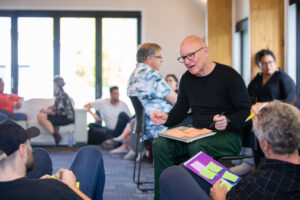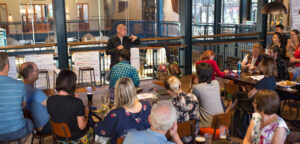
January 31st, 2025
Some Thoughts on a Purposeful 2025
It is almost instinctive for us to set goals and contemplate new beginnings at the start of a new year. This is a tradition of long-standing. On Jan 1, 1863, Mark Twain observed, “Yesterday, everybody smoked his last cigar, took his last drink, and swore his last oath. Today, we are a pious and exemplary community”. New Year’s resolutions can be a powerful navigational resource in the face of turbulence and uncertainty. Unfortunately, such resolutions are often short-lived. As Twain observed, “Thirty days from now, we shall have cast our reformation to the winds…We shall also reflect pleasantly upon how we did the same old thing last year about this time”.
There are strong elements of truth in Twain’s pessimistic perspective. A 2023 Forbes study found that only 6% of their 1000 participants followed through on their New Year’s resolutions. Recent You Gov research in the UK is a little more positive. They found that 33% of the participants claimed to have kept all their 2024 New Year’s resolutions with 45% professing to have kept at least some. Despite the mixed results the impulse toward New Year’s resolutions remains. In the You Gov study they found 27% of all their respondents and 52% of 18–24-year-olds planning on New Year’s resolutions for 2025.
A lot of New Year’s resolutions focus on quitting things like sugar, social media and alcohol. These types of “avoidance goals” tend to be much less sustainable than “approach goals” such as taking up running, eating more vegetables or starting a new course. The strength of approach goals lies in their moving towards something positive, rather than moving away from something negative. Consistent with this idea of “moving towards” there are indications that approach goals will be even more potent when located in the service of a larger purpose. For example, there is a big difference between my setting health and fitness goals as an end in themselves and wanting to be alive and healthy to enjoy my grandchildren.
such as taking up running, eating more vegetables or starting a new course. The strength of approach goals lies in their moving towards something positive, rather than moving away from something negative. Consistent with this idea of “moving towards” there are indications that approach goals will be even more potent when located in the service of a larger purpose. For example, there is a big difference between my setting health and fitness goals as an end in themselves and wanting to be alive and healthy to enjoy my grandchildren.
Over the last few years, a stream of “Blue Zones” research has explored the relationship between purpose and longevity. In Okinawa they call purpose “ikigai”. Ikigai loosely translates as having a reason to get up in the morning. In Nicoya, Costa Rica, they use the term “plan de vida” or having a reason to live. In these and other ‘blue zone’ communities having an energising purpose has been found to extend life by up to “seven good years”.
In contrast to the vitality of the blue zone centenarian’s, mythologist Joseph Campbell asserts that when we have no purpose, we may have lots of goals for how we live, but “nothing to live for”. “There’s something inside you”, Campbell writes, “that knows when you’re in the center, that knows when you’re on the beam or off the beam. And if you get off the beam…you’ve lost your life”. Campbell describes living in alignment with our purpose as “following your bliss”. He argues that it amplifies the “experience of being fully alive” and can transform our goal achievement.
If one follows what I call [their] bliss, the thing that really gets you deep in the gut and that you feel is your life…you put yourself on a kind of track that has been there all the while, waiting for you and the life you ought to be living. When you do that doors will open where you didn’t know they were going to be [and] life opens, opens, opens up, all along the line.

Consistent with the blue zone research there is a great deal of empirical evidence that affirms the life enhancing and life extending power of purpose. For example, a few years ago, I did case studies of 16 people who had a strong and purposeful connection with their work. In describing their experience they used terms like, “alignment”, “flow”, “ease”, “abundance”, “connectedness”, “rhythm”, “joy”, “magic”, “juiciness”, and “awe”. These are the kind of feeling states that “positive psychology” research has consistently associated with purpose. This research indicates that meaningful purpose, as Michael Steger has argued, is “an absolute cornerstone of wellbeing and flourishing”.
All the above suggests that the impulse toward New Year’s resolutions (despite their mixed success), is a positive one. Rather than limiting ourselves to setting a few goals however, the reflective spaces of the New Year (or indeed any part of the year) might be best used to realign ourselves with our purpose, with our “reason to get up in the morning”. The energy of that purpose can provide a context that increases the chances of achieving our goals and act as an anchor and guide in times of disruption and turmoil. Times such as these.
This piece was written by Dr Pete Cammock, Leadership Lab Director.
You can read more stories of impact as well as thought-provoking pieces from across our Leadership Lab ecosystem by signing up for this monthly pānui (see bottom of www.leadershiplab.co.nz) or by connecting with us on our Leadership Lab LinkedIn and Facebook . Thanks heaps for your interest.

January 31st, 2025
Some Thoughts on a Purposeful 2025
It is almost instinctive for us to set goals and contemplate new beginnings at the start of a new year. This is a tradition of long-standing. On Jan 1, 1863, Mark Twain observed, “Yesterday, everybody smoked his last cigar, took his last drink, and swore his last oath. Today, we are a pious and exemplary community”. New Year’s resolutions can be a powerful navigational resource in the face of turbulence and uncertainty. Unfortunately, such resolutions are often short-lived. As Twain observed, “Thirty days from now, we shall have cast our reformation to the winds…We shall also reflect pleasantly upon how we did the same old thing last year about this time”.
There are strong elements of truth in Twain’s pessimistic perspective. A 2023 Forbes study found that only 6% of their 1000 participants followed through on their New Year’s resolutions. Recent You Gov research in the UK is a little more positive. They found that 33% of the participants claimed to have kept all their 2024 New Year’s resolutions with 45% professing to have kept at least some. Despite the mixed results the impulse toward New Year’s resolutions remains. In the You Gov study they found 27% of all their respondents and 52% of 18–24-year-olds planning on New Year’s resolutions for 2025.
A lot of New Year’s resolutions focus on quitting things like sugar, social media and alcohol. These types of “avoidance goals” tend to be much less sustainable than “approach goals” such as taking up running, eating more vegetables or starting a new course. The strength of approach goals lies in their moving towards something positive, rather than moving away from something negative. Consistent with this idea of “moving towards” there are indications that approach goals will be even more potent when located in the service of a larger purpose. For example, there is a big difference between my setting health and fitness goals as an end in themselves and wanting to be alive and healthy to enjoy my grandchildren.
such as taking up running, eating more vegetables or starting a new course. The strength of approach goals lies in their moving towards something positive, rather than moving away from something negative. Consistent with this idea of “moving towards” there are indications that approach goals will be even more potent when located in the service of a larger purpose. For example, there is a big difference between my setting health and fitness goals as an end in themselves and wanting to be alive and healthy to enjoy my grandchildren.
Over the last few years, a stream of “Blue Zones” research has explored the relationship between purpose and longevity. In Okinawa they call purpose “ikigai”. Ikigai loosely translates as having a reason to get up in the morning. In Nicoya, Costa Rica, they use the term “plan de vida” or having a reason to live. In these and other ‘blue zone’ communities having an energising purpose has been found to extend life by up to “seven good years”.
In contrast to the vitality of the blue zone centenarian’s, mythologist Joseph Campbell asserts that when we have no purpose, we may have lots of goals for how we live, but “nothing to live for”. “There’s something inside you”, Campbell writes, “that knows when you’re in the center, that knows when you’re on the beam or off the beam. And if you get off the beam…you’ve lost your life”. Campbell describes living in alignment with our purpose as “following your bliss”. He argues that it amplifies the “experience of being fully alive” and can transform our goal achievement.
If one follows what I call [their] bliss, the thing that really gets you deep in the gut and that you feel is your life…you put yourself on a kind of track that has been there all the while, waiting for you and the life you ought to be living. When you do that doors will open where you didn’t know they were going to be [and] life opens, opens, opens up, all along the line.

Consistent with the blue zone research there is a great deal of empirical evidence that affirms the life enhancing and life extending power of purpose. For example, a few years ago, I did case studies of 16 people who had a strong and purposeful connection with their work. In describing their experience they used terms like, “alignment”, “flow”, “ease”, “abundance”, “connectedness”, “rhythm”, “joy”, “magic”, “juiciness”, and “awe”. These are the kind of feeling states that “positive psychology” research has consistently associated with purpose. This research indicates that meaningful purpose, as Michael Steger has argued, is “an absolute cornerstone of wellbeing and flourishing”.
All the above suggests that the impulse toward New Year’s resolutions (despite their mixed success), is a positive one. Rather than limiting ourselves to setting a few goals however, the reflective spaces of the New Year (or indeed any part of the year) might be best used to realign ourselves with our purpose, with our “reason to get up in the morning”. The energy of that purpose can provide a context that increases the chances of achieving our goals and act as an anchor and guide in times of disruption and turmoil. Times such as these.
This piece was written by Dr Pete Cammock, Leadership Lab Director.
You can read more stories of impact as well as thought-provoking pieces from across our Leadership Lab ecosystem by signing up for this monthly pānui (see bottom of www.leadershiplab.co.nz) or by connecting with us on our Leadership Lab LinkedIn and Facebook . Thanks heaps for your interest.

